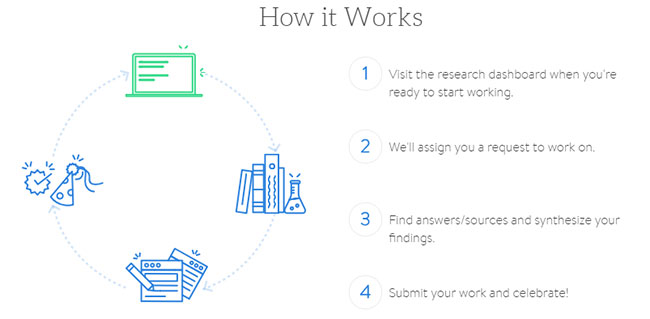Recently, I pitched the following article idea to WritersWeekly:
“Unexpected Sites Where You Can Market (and Profit from) Your Freelance Writing Skills: “Content Mills” (e.g., Squidoo)”
The response I received back was a bit of a shocker:
“I’m sorry but we never suggest writers write for content mills. They are horrible.”
Needless to say, I didn’t win that article pitch.
What I had failed to realize was that content mills are a big source of debate and contention among freelance writers. Some writers’ organizations refuse to even speak about them. Other freelance writers take a difference stance and view working in content mills as a kind of internship.
What are content mills?
In essence, content mills are low-paying online writing sites that either pay you an up-front free for your submitted content and/or make you a part of their revenue-sharing program (based on your content’s page views).
Some example content mill sites include HubPages, Yahoo! Voices, Infobarrel and, as mentioned above, Squidoo. Other sites, such as Textbroker and Constant Content, post specific writing requests from individual clients that are paid on a per-word basis. Unless you are writing 20+ articles/day for these sites, you will probably NOT get rich from content mills. At most, you’ll be able to purchase groceries or holiday gifts from earnings deposited into your content mill kitty. Oh, and don’t forget that even these piddly monies are still considered taxable by the IRS.
Why write for content mills?
While many freelance writers would disagree, there are several benefits to writing for content mills, especially if you are just starting out in your writing career:
- Practice, practice, practice. You get to practice on your writing, make your mistakes and learn from them. You see what works- and what fails- in terms of reaching your target audience and getting page views. You certainly become a better writer.
- Learn. Content mills like Examiner offers tutorials and lessons on how to write better through its Examiner University. HubPages asks writers to produce content on demand with the “30 Hubs in 30 Days” challenge. Obviously, improving the quality of your writing is of benefit to the content mills since they achieve higher traffic and ad revenue by doing so. However, these same benefits also trickle down to you, increasing your up-front pay and page views over time.
- Benefits. When I first started writing for Associated Content (now Yahoo! Voices), I had to be satisfied with earning $5 per article or fewer. However, as my seniority with the site increased, so did my opportunities to write for specific content niches such as personal finance. This increased my pay rate substantially. I was also offered partner assignments that were published on big-name sites like The Huffington Post, Oral-B, AT&T and CreditCards.com.
- References. As my content mill library grew, so did outside interest in my work. I gained one full-time client because of my work with Textbroker. Another client liked the fact that I was submitting content to sites like Yahoo! Finance and MSN Money and asked me to write financial articles for him too. In short, although content mill work wasn’t paying me all that much, it was certainly getting my name out there.
- Confidence. I knew the kind of praise some of my best work had won for me and I used that praise as impetus to approach potential clients. Thanks to various partner assignments, I also had actual “outside-of-mill” work that I could show off in my resume. Clients starts noticing- and hiring.
Why you should NOT write for content mills
So, if “working in the mill” helped launch my own writing career, why are content mills looked upon as “horrible” by many freelance writers? Here are a few quite valid reasons that I’ve received:
- Slave wages. Content mills ask for stellar, SEO-qualified and interesting content- and then pay you a penny per word or even fewer for something that takes all day to produce. Many writers end up earning below minimum wage for their work. Others work 12+ hour days in order to eek out a somewhat decent living from their writing efforts.
- Low quality writing. Let’s face it: You simply cannot hope to produce your best work when you’re hustling through 10 or more writing assignments each day. The quality of your submissions will suffer- and so will your reputation as a writer. High paying clients may pass you by once they review your articles and see them riddled with spelling errors and/or mindless drivel.
- Wasted time. Writing for content mills uses up the time and energy you could’ve put forth to attract big name clients and budgets. Many content mill writers never send out a query letter that might help them land a better job. Others never have the chance to write for charity and other free publications that at least build up their writing resume. “Penny-wise and pound foolish” becomes the underlying motto of many content mill writers as they chase after a few dollars here and there and miss out on five- and six-figure writing incomes.
- Lack of respect. The French author Jules Renard stated, “Writing is the only profession where no one considers you ridiculous if you earn no money.” Some writers won’t work in content mills simply on a matter of principle. In essence, they view writing as a job, and no recruiter in this day and age would expect an employee to work for 50 cents an hour with no benefits. If corporate writers receive $30-$50/hour, then so should freelance writers doing the same type of work. Settling for anything less sets a bad norm for writers and makes other professionals lose respect for them.
The Bottom Line
In the end, is working for content mills a worthwhile venture or a waste of time and effort? It depends. If you can look upon your “time at the mill” as a proving ground for honing your skills and talent, then your efforts are not in vain. If you make sure to allot some of your time towards sending out query letters and courting potential clients with free articles and blog posts, then at least you are making some headway into a more stable and lucrative writing career.
Unfortunately, the biggest mistake that most content mill writers make is to have no exit strategy in place. Year after year, they settle for less money than they’re worth and miss out on valuable job opportunities. Some content mill writers who have sent out query letters and been rejected feel that “the mill” is the only place that they’ll ever find work, a feeling that becomes a self-fulfilling prophesy once they stop making plans to find anything better.
Personally, I never had an exit strategy in place during my time at “the mill”. In fact, I still submit content to various mills from time to time- especially now that I have clients willing to pay me additional money for that option. However, had I started reaching out sooner to private clients, I would be much better situated today. I also would’ve been able to quit my “real job” sooner to start my freelance writing career. Knowing what I know now, I certainly would’ve taken a different approach earlier on. Alas, my hindsight has always been about 18/20.



